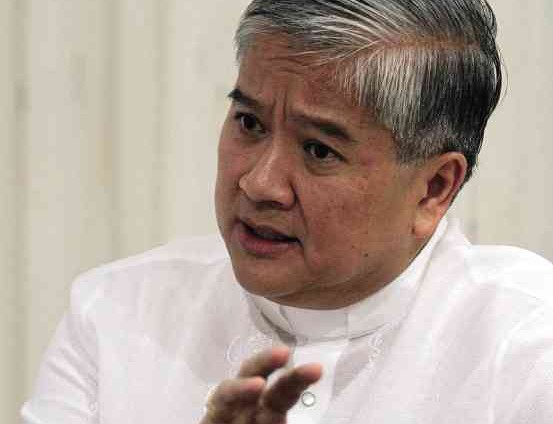CBCP to Catholic solons, judges: Oppose death penalty
The Catholic Bishops Conference of the Philippines (CBCP) on Wednesday urged lawmakers and the public to oppose proposals to restore death penalty in the country, saying it transgresses the dignity of the human person.
CBCP President and Lingayen-Dagupan Archbishop Socrates Villegas said there was a “striking and compelling contradiction and irreconcilability” between death sentence and the constitutional prohibition of cruel and unusual punishment.
“For many centuries, the death penalty was unquestionably accepted by most including the Church. However, with time our understanding evolves and we learn to become more human in our behavior according to the dignity bestowed upon us and our moral sense evolves,” Villegas said in an ethical guideline released on Wednesday.
“You cannot, without contradiction, insist that the person is secure from cruel punishment and at the same time open the possibility of inflicting upon him or her the most cruel punishment possible: the calculated, planned and deliberate deprivation of life!” he added.
The revival of death penalty, the first bill filed in the House of Representatives in the 17th Congress, is one of the main thrusts of the administration of President Rodrigo Duterte.
Article continues after this advertisementREAD: First bill in Congress seeks reinstatement of death penalty
Article continues after this advertisementCBCP’s statements came amid confusing accounts on Duterte’s supposed “go-ahead” for the execution of Filipina convicted drug courier Mary Jane Veloso, who remains on death row in Indonesia for drug smuggling.
‘Legal obligation’
Villegas summarized the Philippine Catholic Church’s appeal into three points: for Catholic lawmakers to withhold support from any attempt to restore the death penalty; for Catholic jurists to study the issue and to oppose, through proper judicial proceedings, the re-introduction of capital punishment; and for Catholic judges to heed the teaching of the Church and to appreciate every possible attenuating or mitigating circumstance so as not to impose the death penalty.
Citing the Second Optional Protocol to the Covenant on Civil and Political Rights, which the Philippines ratified, Villegas said the Philippines has an international legal obligation not to restore death penalty. Article 1 of the Protocol states that “no one within the jurisdiction of a State Party to the present Protocol shall be executed,” and that “each State Party shall take all necessary measures to abolish death penalty within its jurisdiction.”
“Believing that the abolition of the death penalty contributes to the enhancement of human dignity and the progressive development of human rights, convinced that all measures of abolition of the death penalty should be considered as progress in the enjoyment of the right to life, these are some of the premises underlying the obligation of State-parties, among them the Philippines, not to execute anyone and not to restore the death penalty to our statute books,” Villegas said.
‘Unchristian, primitive’
The CBCP president said favoring the restoration of death penalty is a position “that the Christian cannot and must not maintain,” noting that it is equivalent to depriving a person of the right to life.
“When the State kills in the name of justice, it is in fact saying that the condemned person has no right to live, is undeserving of the basic right to life, and that there is no saving quality or attribute in him or her whatsoever,” Villegas said.
“The Gospel by which we all live and in which we all find hope is one that proclaims the inestimable value of human life and the inexhaustible love and mercy of God that constantly renews, even when it seems that no renewal is likely or possible!” he added.
Villegas said taking someone’s life as punishment for an offense was not “paying back,” but “some primitive sense that engenders the discredited ‘eye for an eye, tooth for a tooth.’”
READ: Rody: Death penalty is for retribution
“When the State kills, it kills with no less reprehensibility as when a criminal kills, for the same violence is involved, and the result is the same: the curtailment of human life and the violation of its inalienable value and worth,” he said. “Not really retribution then but the restoration both of the victim as well as society and the offender to optimal, human, humanizing and just relations! This is the positive moment of justice.” RAM
RELATED STORIES
Pro-life solon says support for death penalty ‘weak, shallow’
Death penalty: ‘The cheaper, the better’
